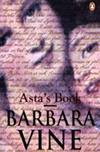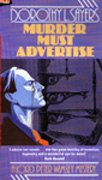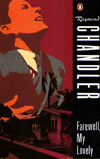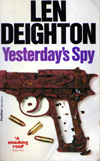THRILLER / MYSTERY
First off, two trashy thrillers loaned by a friend (thanks Gertie!) -
The Marketmaker by Michael Ridpath and The Legacy
by Murray Smith. The Marketmaker is your standard financial services
thriller, and The Legacy is a romp over America and Ireland sucking in
police, millionaires, the mafia, lawyers aplenty, and a sinister Japanese
businessman. The reason these go in here is that they both have great
main characters. The Marketmaker's is Ricardo Ross, super-trader extraordinaire,
and I defy anyone not to like him in spite of his hard-nosed business
attitude. He's ruthless but he's fair - and omnicompetent. And very cool.
Hero, so to speak, of The Legacy is Peter Girola, don of Boston, a Mafia
chief with doubts about his vocation. Girola, like Ricardo, is ruthless
and unsentimental, but he's so good at what he does and so cool under
pressure you have to like him. And he's not *bad* - he's conditioned from
childhood. And he does change. Really 8)
Old-fashioned detective stories are great to fill an hour or two on a bus - with no complex characters to worry about you can just relax and follow along with the plot. If you're feeling really energetic you can try and figure out who the killer is - most of the time I'm just lazy and let the author tell me in her own good time. The most old-fashioned of the old-fashioned kind is Agatha Christie - every book has its doctor, its vicar, its retired colonel, its twittery old maid, its young son of the Big House who is either a dashed good chap or a deuced scoundrel, and its token girl, who is either a sweet young thing or a "modern" fast girl with lipstick, bobbed hair, and training to - gasp - go on the stage. Still, the plots are enough in themselves to provide entertainment, particularly her most famous book, The Murder of Roger Ackroyd, which is probably the only murder story I've ever read where I remember who the killer is. A terrifically ingenious idea and a very well-constructed book. Just don't look for good writing or interesting characters - apart from Hercule Poirot, who, although 2D, is fun 8)
Similarly old-fashioned is Ngaio Marsh,
with her detective, the ferociously tall, thin and well-bred Roderick
Alleyn. Again, good ideas, good plots, cardboard characters, dodgy writing.
Great for killing time on the bus - books to be read in an hour or two
and then put away for a rainy afternoon when the TV aerial is on the blink.
I think Ngaio Marsh suffers from the same problem as PD James -
an all-enveloping crush on her hero. Both heroes are good-looking, clever,
and arbiters of taste beside which all the other characters look squalid,
ill-bred, and tacky. They are the repositories of all virtue: particularly
PD James' Adam Dalgleish, who writes the traditional slim volumes of poetry
(and she actually uses that expression a number of times!) just to show
he's sensitive as well as clever. She seems to think his aloof, taciturn
demeanour shows how educated and superior he is - I think it makes him
seem a hideous snob, but that's just me. It doesn't stop me reading her
books, which usually have good stories and far more rounded characters
than the traditional school of detective fiction. Although, does anyone
else out there think that the terrorist element of Devices and Desires
was just completely incredible??
Ruth Rendell is another popular crime writer: I have to say I'm not a fan of her detective stories. I ca'n't warm to her Inspector Wexford, and there is something I just don't like but ca'n't put my finger on about the books (they have great titles though, to be superficial 8)). However, she also writes thrillers under the name Barbara Vine, and bizarrely, I really like these. Her ideas are great, the books are well-written and the characters are usually all-absorbing. The sense of place in these books is very strong, very atmospheric - even picking up the glacial No Night is Too Long makes me feel like a cold wind is blowing over me.
A crime writer in the traditional mould
that I don't find fault with is Dorothy L Sayers, author of the
Lord Peter Wimsey dete ctive
stories. For some reason her liking for her character doesn't annoy me,
and neither does the character himself, who has many of the same flaws
as Alleyn and Dalgleish. Lord Peter is a far more complex character than
either of these: a Major in the first world war, he suffered a complete
nervous breakdown due to shellshock, and although the books take place
long after this its effects have reverberated down the years with him.
He falls in love with an equally complex woman, Harriet Vane, and the
books are as much about their difficult and complicated relationship as
about crime, preceding the modern style of making crime stories complete
novels. I've read all of the LPW books several times and still don't feel
like I have a full grasp of the characters - every time I reread them
I discover something new about them or interpret their actions in a different
way, which for me makes the books worth reading over and over. A new book
has recently come out, a fragment left by Sayers finished by Jill Paton
Walsh, which is a welcome new LPW read - it's good but it's not Sayers:
Wimsey and Harriet are different somehow - more open. More modern, I think.
Apart from that it is very well done, though.
ctive
stories. For some reason her liking for her character doesn't annoy me,
and neither does the character himself, who has many of the same flaws
as Alleyn and Dalgleish. Lord Peter is a far more complex character than
either of these: a Major in the first world war, he suffered a complete
nervous breakdown due to shellshock, and although the books take place
long after this its effects have reverberated down the years with him.
He falls in love with an equally complex woman, Harriet Vane, and the
books are as much about their difficult and complicated relationship as
about crime, preceding the modern style of making crime stories complete
novels. I've read all of the LPW books several times and still don't feel
like I have a full grasp of the characters - every time I reread them
I discover something new about them or interpret their actions in a different
way, which for me makes the books worth reading over and over. A new book
has recently come out, a fragment left by Sayers finished by Jill Paton
Walsh, which is a welcome new LPW read - it's good but it's not Sayers:
Wimsey and Harriet are different somehow - more open. More modern, I think.
Apart from that it is very well done, though.
Above all these there is my beloved Philip
Marlowe, Ray Chandler's hard-boiled 1950s private eye. Chandler,
for all his pulp origins,  was
a terrific writer: tough, dark, and literary, every sentence is a delight.
Characters are perfectly captured in a few lines, his sense of place is
terrific - we feel we are walking the streets with Marlowe - and the plots
are dense, twisted webs, where everyone is linked to everyone else by
threads of corruption, sleaze, and greed. Marlowe himself is an immortal
character. Click here to read some of what I
like about him: fundamentally decent, solid, a man with true grit and
integrity. And as with all tough guys, he has a sensitive heart underneath,
most visibly in The Long Goodbye and Playback. One of my
favourite Marlowe moments takes place where he's standing on the steps
leading up to his house, watching a baby bird trying to take its first
flight. He watches for a while, then "I went inside and shut the
door and left him to his flying lessons. Birds have to learn too."
It's so Marlowe - he's soft enough to notice the baby bird, but unsentimental
enough to leave him to it. A great character, and would vie with Ajjibawr
for my Ideal Husband nomination 8).
was
a terrific writer: tough, dark, and literary, every sentence is a delight.
Characters are perfectly captured in a few lines, his sense of place is
terrific - we feel we are walking the streets with Marlowe - and the plots
are dense, twisted webs, where everyone is linked to everyone else by
threads of corruption, sleaze, and greed. Marlowe himself is an immortal
character. Click here to read some of what I
like about him: fundamentally decent, solid, a man with true grit and
integrity. And as with all tough guys, he has a sensitive heart underneath,
most visibly in The Long Goodbye and Playback. One of my
favourite Marlowe moments takes place where he's standing on the steps
leading up to his house, watching a baby bird trying to take its first
flight. He watches for a while, then "I went inside and shut the
door and left him to his flying lessons. Birds have to learn too."
It's so Marlowe - he's soft enough to notice the baby bird, but unsentimental
enough to leave him to it. A great character, and would vie with Ajjibawr
for my Ideal Husband nomination 8).
Into this category I'm throwing two spy
writers - Len Deighton and Alan Furst. Len Deighton is the
author of such spy classics as Funeral in Berlin; Yesterday's
Spy; the three Bernard Samson trilogies; and, of course, The Ipcress
File. Made into 60s films which  are
supposed to be terrific (my Michael Caine allergy prevents me from verifying
this), these are my favourite spy books (and I've read a *lot* 8)). His
main characters tend to be similar: they are always clever, in fact far
too clever for their own peace of mind, as they ca'n't blind themselves
to the moral contradictions and compromises of their work and the machinations
of their often less than well-intentioned superiors. Clever, cynical,
a trifle world-weary, they prowl warily through their wildernesses of
mirrors in the best espionage tradition. Highly recommended. Also recommended
are Alan Furst's takes on the spy novel, Night Soldiers, Dark
Star, The Polish Officer, and The World at Night. Furst uses
the espionage genre as a way of exploring the murky worlds of pre- and
post-WWII Europe. His books are as much history lessons as thrillers,
and terrifically atmospheric. As several characters overlap through the
different books, you get involved in these people's lives: it's genuinely
upsetting when people meet the fate which their dangerous world makes
almost inevitable. His main characters will stick around in the corners
of your mind: ordinary people drawn into this world, sucked slowly deeper
and deeper into the mire until they drown, while you watch helpless, hoping
someone will stretch out a hand to save them. Read the books and you'll
know what I mean 8)
are
supposed to be terrific (my Michael Caine allergy prevents me from verifying
this), these are my favourite spy books (and I've read a *lot* 8)). His
main characters tend to be similar: they are always clever, in fact far
too clever for their own peace of mind, as they ca'n't blind themselves
to the moral contradictions and compromises of their work and the machinations
of their often less than well-intentioned superiors. Clever, cynical,
a trifle world-weary, they prowl warily through their wildernesses of
mirrors in the best espionage tradition. Highly recommended. Also recommended
are Alan Furst's takes on the spy novel, Night Soldiers, Dark
Star, The Polish Officer, and The World at Night. Furst uses
the espionage genre as a way of exploring the murky worlds of pre- and
post-WWII Europe. His books are as much history lessons as thrillers,
and terrifically atmospheric. As several characters overlap through the
different books, you get involved in these people's lives: it's genuinely
upsetting when people meet the fate which their dangerous world makes
almost inevitable. His main characters will stick around in the corners
of your mind: ordinary people drawn into this world, sucked slowly deeper
and deeper into the mire until they drown, while you watch helpless, hoping
someone will stretch out a hand to save them. Read the books and you'll
know what I mean 8)
